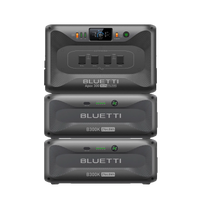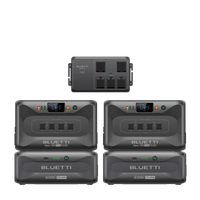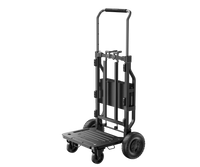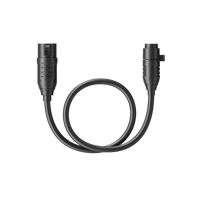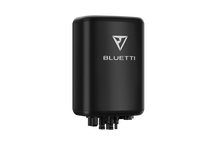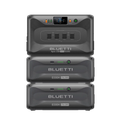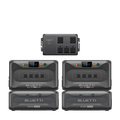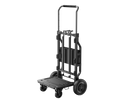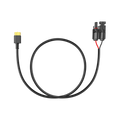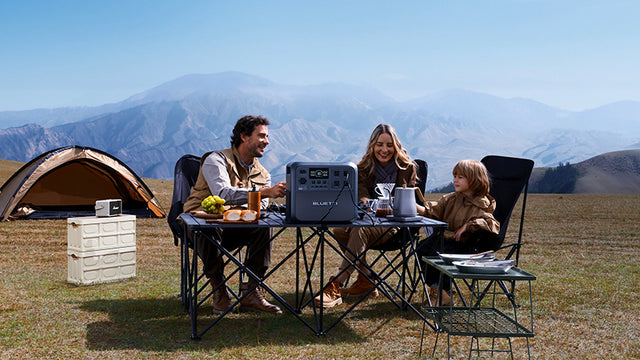Your cart is empty
Shop our productsIn need of a solar panel for a refrigerator? You're in the right place. Solar power is a great solution for reducing electricity bills or going off-grid.
Buying a solar panel for a refrigerator seems simple but requires careful planning. That is why, before you purchase it, you need to understand your refrigerator's power consumption and the solar panel output required accordingly.
We will also discuss several features of solar systems you need to keep in mind. Now, the main question is: can a 100W solar panel run a refrigerator? You will find the answer as well, along with some impressive solar products that you will absolutely love.
So, what are you waiting for? Get reading!
Understanding Refrigerator Power Consumption

First of all, let's understand the factors that affect how much power your refrigerator requires before buying a solar refrigerator.
1. Size
What size refrigerator do you own? Depending on your daily needs, you have a different-sized refrigerator, and each size has a different power requirement. You need to know its power consumption to ensure you buy the right solar panel for the refrigerator.
You can find the average power consumption of your refrigerator in its user manuals. Also, refrigerators require a higher starting wattage, ranging from approximately 2 to 10 times the running wattage. So, you need to ensure your solar system for the refrigerator is capable of that.
|
Refrigerator Size |
Average Running Wattage |
Starting Watts |
|
Mini Refrigerator |
50W – 90W |
200W – 360W |
|
Standard Refrigerator |
90W – 180W |
360W – 720W |
|
Side-by-side Refrigerator |
180W – 200W |
720W – 800W |
These are approximate running wattages. Actual energy use depends on the duty cycle (typically 30–50% for modern refrigerators). Starting wattage varies by model, especially for inverter-based refrigerators, which may have lower surge requirements.
2. Energy Rating
Next, we have the energy rating of your refrigerator. Search for the Energy Star® label on your refrigerator. You might not deem this little piece of paper important, but its readings play a big role in whether your refrigerator is cost-effective or not.
If the start rating is high, it means your refrigerator is energy efficient, i.e., it won't consume too much power while running. Conversely, a lower star rating indicates a lower energy efficiency.
3. Usage Patterns
The usage patterns of a refrigerator also affect its power consumption. Your regular usage patterns are actions you commonly end up doing unconsciously. But now, you need to start noting them to realize how they consume power.
For instance, how many times a day does the door of your refrigerator open? What temperature setting do you have your refrigerator on? If you frequently open the refrigerator door and have a high-temperature setting, know that these actions eat away at power.
4. Compressor Cycles
The compressor cycles dictate when the refrigerator cools. Naturally, the longer the compressor cycle runs, the greater the power it will consume. On the other hand, if it is run strategically, it will guzzle less power.
You need to understand the compressor cycle of your refrigerator. Then, you can take effective measures to ensure that its usage is reduced to save on electricity costs.
Find out the best battery-powered generator for a refrigerator when there's an outage.
Factors Affecting the Solar Panel Output
Moving on, we will now discuss some important elements to keep in mind after you have bought the solar panel for the refrigerator.
1. Sunlight Intensity
Solar panel system for refrigerator, as its name suggests, runs on the Sun's solar power. Therefore, its working capacity is greatly reduced when there is not ample sunlight.
Keeping this in mind, know that only on days when there is strong sunlight will the solar panels harness most solar power. On days when there is less sunlight, the power produced will be less.
Cloudy or rainy weather significantly reduces solar panel output, often to 10–25% of full capacity. Thus, you need to keep in mind the weather of your location to determine where you place your solar panel for a refrigerator.
2. Panel Tilt Angle

Panel tilt angle is a point most people do not give importance to when it comes to solar for a refrigerator. However, keep in mind that the angle at which your solar panels are placed matters significantly.
Tilt the solar panels so that maximum sunlight falls on them. Only when it can harness a great amount of sunlight can it power its whole system, and that system, in turn, powers your refrigerator or even your whole house.
3. Shading
Next, we have the placement of your solar panels. Where will they be placed in your house? In the garage or rooftop? In those places, have you provided a shadow over them or left them as is?
It might be surprising, but you cannot leave your solar panels in the shadows. Under shadows, the sunlight they can catch will be significantly reduced. How can solar panels provide you with maximum output when they do not even receive maximum sunlight?
What Needs to Consider When Choosing Solar Panel Systems?
Let us now compare several important aspects of a solar panel for a refrigerator to determine the factors you need to keep in mind when purchasing a solar panel system.
A complete solar power system for a refrigerator includes solar panels to generate electricity, a battery to store energy, an inverter to convert DC to AC power, and a charge controller to manage battery charging. To size a solar power system, calculate your refrigerator's daily energy use (Wh), estimate local peak sun hours, and select a battery and inverter to meet both running and starting wattage needs.
1. Power Output
Different solar panels have varying power output capacities. Solar panels with a higher wattage will undoubtedly produce more power for your refrigerator. Meanwhile, those with comparatively lesser wattage will produce less power.
Therefore, you need to take care in choosing a solar panel for a refrigerator that can run the refrigerator you own. Also, ensure that it can withstand the starting wattage of your refrigerator.
2. Cost-Effectiveness
When we talk about cost-effectiveness, we do not just mean your budget. We are referring to three things - namely, your initial investment, the maintenance costs, and the future savings you will have on electricity bills.
Carefully consider all three of these factors before going out to buy a solar panel system for a refrigerator. While the return on investment is extremely high due to reduced electricity bills, the initial investment is not small.
3. Reliability
You also need to keep in mind the reliability of the solar for the refrigerator you will purchase; it needs to be of high quality. After all, if there is no guarantee of the quality of the components used, you are not assured that the system will run smoothly and for a long time.
Investing in a low-quality system can lead to malfunctions and frustration. Choose a reliable, high-quality solar panel system.
4. Ease of Installation
Once you have brought the solar system for the refrigerator home, it is now time to install and set it up, and this task is up to you to perform. Therefore, you also need to make sure that the solar panel system for the refrigerator you buy has simplified installation processes and user-friendly designs.
One wrong step in setting it up and you can jeopardize the whole system. Ensure proper setup to avoid system issues.
Can a 100 Watt Solar Panel Run a Refrigerator?
It depends on your refrigerator's watts. In order to purchase the right solar for your refrigerator, you need to first calculate the wattage of your refrigerator. Calculating the wattage of your refrigerator is quite easy, actually. All you need to do is multiply the amps and volts of your refrigerator.
You will easily find these values on your manufacturer's label. Usually, the manufacturer's label also states the wattage requirements of your refrigerator.
A 90W mini refrigerator uses ~2,160 Wh/day (90W × 24h). With 4 peak sun hours, a 100W panel produces 400 Wh/day, requiring a battery of at least 2,500 Wh to cover daily use, nighttime operation, and inverter losses (10–20%).
BLUETTI Solar Panel for Your Refrigerator
As we have seen above, different sizes of refrigerators have varying power requirements and starting wattage. A 100W solar panel alone cannot reliably run a standard refrigerator (150–400W) without a battery and inverter system to store and convert energy.
Refrigerators require continuous power, so a battery bank is essential. A 100W panel producing 400 Wh/day (4 peak sun hours) may need a 1,000–2,000 Wh battery to run a 90W fridge overnight.
We will recommend some complete solar power systems for both mini refrigerators and other types of refrigerators. It's totally on you to choose the one that best suits your needs.
1. BLUETTI Elite 100 V2 + SP100L Solar Panel

The BLUETTI Elite 100 V2 + SP100L Solar Panel is a remarkable solar power systems for refrigerator that you will not regret having.
Key Features:
Capacity: It has a capacity of 1024Wh and 1800W output. It is suitable for mini refrigerators but may require additional panels for standard or side-by-side models.
High Efficiency: Using monocrystalline solar cells, it can convert sunlight into solar power with an efficiency of up to 23.4%, guaranteeing you great efficiency for running your refrigerator.
Durability: It has a long-lasting ETFE (Ethylene Tetrafluoroethylene) coating with UV resistance and an IP65/IP67 rating, which can withstand even severe weather conditions. It can run your refrigerator and even other home appliances for a long time without wearing out.
Portability: It is both foldable and portable; thus, you can carry it around with you when going camping or off-grid. Lightweight design (as low as 10.9 lbs) with an easy-carry handle makes it ideal for travel.
Compatibility: It can be used with most solar generators with standard MC4 connectors and supports flexible wattage options from 60W to 350W; thus, you can easily use it with solar systems you already have.
2. BLUETTI Apex 300 + 350W Solar Panel

Another solar system for refrigerators that you can consider is the BLUETTI Apex 300 + 350W Solar Panel.
Key Features:
Capacity: It has a capacity of 2,764.8Wh but can be expanded up to 19kWh with 6*B300K batteries.
High Efficiency: With monocrystalline solar cells offering up to 23.4% conversion efficiency, it ensures reliable solar power for your refrigerator and other appliances.
Durability: Equipped with a rugged ETFE coating and IP65 water-resistant design, it is built to withstand harsh outdoor environments, including rain, dust, and UV exposure. Tempting, isn't it?
Portability: It can be easily folded and thus is portable. You can carry it around with you wherever you go.
Compatibility: It is also compatible with most solar generators with MC4 connectors, allowing you to use it with any existing solar generators you have without any issues.
3. BLUETTI AC200L+ PV350 Solar Kit

The BLUETTI AC200L+PV350 Solar Kit is a solar kit for a refrigerator you will absolutely love to have, owing to its flexible features.
Key Features:
Capacity: It has a capacity of 2,048Wh but can be expanded up to 7,577.6Wh with 2*B300K batteries.
Battery: It has both the LiFePO₄ battery (3,000+ cycles to 80% capacity) and the advanced Battery Management System (BMS), ensuring durability and reliability to run your refrigerator and other electrical appliances.
Faster Charging: It has 2,400W of AC charging power, recharging fully in about 1.5 hours (80% in ~45 minutes). On the solar side, it supports up to 1,200W solar input, so you can recharge it efficiently using sunlight when off-grid.
Efficient Output: You can pair this system with a D40 voltage regulator (sold separately) to convert it into a highly efficient DC power source. It can charge not only your refrigerator but also other electrical appliances.
Final Words
In conclusion, you must now understand how to estimate your refrigerator's average power consumption. You've learned how to assess solar panel output and key considerations for choosing a solar panel system for refrigerators.
If you've a mini refrigerator, you can use the 100W solar panel to fulfill your needs. For other refrigerators, you look for alternatives. While you are at it, the BLUETTI 350W Solar Panel and the BLUETTI AC200L+ PV350W Solar Kit are great options to consider.
FAQs
1. Can a 100-watt solar panel run a refrigerator?
A 100W solar panel alone cannot run a standard refrigerator (150–400W) without a battery (e.g., 1,000–2,000 Wh) and inverter to store and convert energy. You'll need batteries and possibly more panels for reliable use.
2. How many solar panels do I need to run a refrigerator?
Most refrigerators require at least 2 to 4 panels of 100W each, depending on daily energy use. The exact number depends on fridge size and sunlight hours.
3. Can a small fridge run on a 100W solar panel?
Yes, a mini-fridge or portable 12V fridge may run on a 100W panel with a battery. However, power efficiency and storage are crucial for continuous cooling.
Shop products from this article
Be the First to Know
You May Also Like

What Does a 30% Federal Solar Tax Credit Mean and How to Apply?
Governments around the world are offering programs that encourage homeowners to switch to solar energy. Among the most notable programs is the 30% Federal Solar Tax Credit. It reduces your...

Deadly Flooding Devastates U.S. South and Midwest — What You Need to Know















